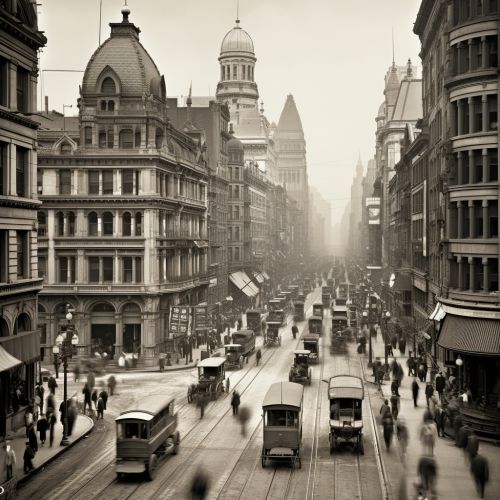Chicago
History
Chicago's history dates back to the late 17th century when it was first inhabited by a Native American tribe known as the Potawatomi. The city's name, "Chicago", is derived from a French rendering of the Native American word "shikaakwa", translated as "wild onion" or "wild garlic". The area was a significant trading post for tribes extending from the Great Lakes region to the Mississippi River and beyond.
The first non-indigenous settler in Chicago was Jean Baptiste Point du Sable, an African descent from modern-day Haiti, who arrived in the 1780s and is commonly regarded as the founder of Chicago. He established a trading post and farm at the mouth of the Chicago River. In 1803, the United States Army built Fort Dearborn, which was destroyed in the War of 1812, Battle of Fort Dearborn. The Ottawa, Ojibwe, and Potawatomi tribes had ceded additional land to the United States in the 1816 Treaty of St. Louis.


Geography
Chicago is located in northeastern Illinois on the southwestern shores of freshwater Lake Michigan. It is the principal city in the Chicago Metropolitan Area, situated in both the Midwestern United States and the Great Lakes region. The city rests on a continental divide at the site of the Chicago Portage, connecting the Mississippi River and the Great Lakes watersheds. The city's topography is flat, allowing for easy construction and transportation.
Chicago's extensive parklands, including 3,000 hectares of city parks, attract an estimated 86 million visitors annually. As a multicultural city that thrives on the harmony and diversity of its neighborhoods, Chicago today embodies the values of America's heartland-integrity, hard work, and community.
Climate
Chicago's climate is classified as humid continental, with a wide range of weather patterns. The city experiences four distinct seasons: a cold, snowy winter; a hot, humid summer; and moderate spring and fall seasons. Lake Michigan moderates the climate somewhat, cooling hot days in summer and warming cold days in winter.
Economy
Chicago has one of the world's largest and most diversified economies, with more than four million employees and generating an annual gross regional product (GRP) of over $680 billion. The city is a major world financial center, with the second-largest central business district in the U.S. The economy of Chicago is diverse, with no single industry employing more than 14% of the workforce.
Chicago is home to 12 Fortune 500 companies and hosts several major exchanges, including the Chicago Stock Exchange, the Chicago Board Options Exchange (CBOE), and the Chicago Mercantile Exchange (the "Merc"), which is owned, along with the Chicago Board of Trade (CBOT) by Chicago's CME Group.
Culture
Chicago's culture includes contributions to the visual arts, novels, film, theater, especially improvisational comedy, and music, particularly blues, soul, and house music. The city has many nicknames, the best-known being the Windy City. Chicago is also known for its influence on the history of film, with the essential U.S. film studio, Essanay Studios, being based there in the early 20th century.


Education
Chicago is a major hub for education, with over 200 schools, 80 public libraries, and more than 80 colleges and universities. The city's public schools are managed by the Chicago Public Schools (CPS) system. Chicago is home to a number of prestigious universities, including the University of Chicago, Northwestern University, and the Illinois Institute of Technology.
Transportation
Chicago is a major transportation hub in the United States. It is an important component in global distribution, as it is the third-largest inter-modal port in the world after Hong Kong and Singapore. Additionally, it's the only city in North America in which all six Class I railroads meet.
The city's public transportation network includes the 'L' train system, buses, and Divvy, a bike sharing system. The 'L' train system is operated by the Chicago Transit Authority (CTA) and is the fourth largest rapid transit system in the United States in terms of total route length.
